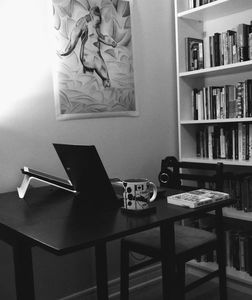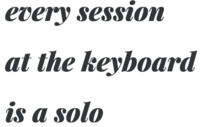A Literary Drum Kit: J.J. Dupuis Takes Us Into His Writing Space & "Musical" Writing Method
If there's still an X-Files shaped hole in your life, you need to be reading J.J. Dupuis, whose delightfully creepy Creature X mystery series follows cryptozoologist Laura Reagan's search for monsters and—reluctantly—murderers. Dupuis started out tackling the Bigfoot legend in Roanoke Ridge, and now he's taking Laura and her documentary team to remote Newfoundland to chase down the truth about Cressie, a Loch Ness monster-esque creature, in Lake Crescent (Dundurn Press).
But the sightings aren't reliable, and the locals aren't talking—and they may have reasons beyond a distrust of outsiders. Laura's team soon finds something, but it's not a prehistoric creature: it's a body, and a complicated cold case that puts them all in danger.
With a third instalment, Umboi Island, lined up for 2022, Dupuis' books are already developing the feel of a modern classic mystery series. We're excited to welcome him here today to take us behind the scenes of his writing process as part of our At the Desk series, where we ask writers to show and tell about where their writing physically takes place.
J.J. paints a unique soundscape of his writing life, which makes sense for a writer who views the process through a musical lens. Read on to hear from J.J. about city sounds, writing as jazz, and more.
At the Desk with J.J. Dupuis
When I first contemplated writing seriously, in my university days, I didn’t use a desk. As with most of my “serious” contemplation in those days, the methodology was missing. With a laptop, I was free to write on the couch or in bed in my tiny apartment, romanticizing the “Bohemian” nature of it all. But that party ended when I went beyond freelance writing gigs and short stories.
Novel writing is serious business and serious business requires a desk. The physical structure of the desk is not what matters, but the structure it provides to the act of writing. Just as the setting of a novel dictates much of the story and puts constraints upon its characters, a writer’s workspace can dictate the rate and shape of their productivity.
Writing fiction, to me, has always been like playing jazz. It’s an act that relies on history and convention, on all that has come before, yet aspires to create something new, in terms of both style and substance. However, every session at the keyboard is a solo, as the collaborative part of writing, working with an editor, comes later. My work, my performance, requires a routine similar to a concert. I need my instruments, I need to warm up and something of a sound check before I get started.
I envision my workspace like a drum kit. My computer at twelve o’clock is the bass drum. My iPad, propped up on its stand at two o’clock is the snare drum. The book or stack of books at ten o’clock is the hi-hat. The mandatory cup of black coffee is something else altogether. With the headphones hanging on the back of my chair, I am good to go.
As with a performance, I don’t just dive right in. There is a tune-up, a time to limber up the brain for the task ahead. Often that means taking a book off the shelf and reading a few lines or a few pages. I usually turn to poetry, something distant enough from my work as to not influence it, but close enough to remind me of the power that words have, their magic when woven together just right. Sometimes I write a few lines of my own, poems not fit for human consumption. I gave up on writing poetry seriously years ago, but writing poetry as a warmup exercise is helpful.
Once I’m settled in, the poetry collection back on the shelf and the coffee steaming, the headphones come on. Where I live and work, on the east side of Toronto, the rumble of the subway rolls through my apartment like thunder across a prairie. It’s a sound that I find more comforting than bothersome. It’s the other noises, sirens, car horns, dogs barking, drunks barking, motorcycles, that disrupt my creative flow. So music and a good pair of headphones are essential.
Your CanLit News
Subscribe to Open Book’s newsletter to get local book events, literary content, writing tips, and more in your inbox
Classic jazz, like Chet Baker, Miles Davis and Sonny Rollins, makes up the soundtrack to my writing day. Songs without lyrics that I know like the back of my hand but can still become lost in, carving out a space to work on my book without letting the noises of the city distract me. I think of the headphones like blinders on a horse, they limit a sense to help maintain focus.
The books in the Creature X series, despite being largely about myths and urban legends, the products of overactive imaginations, require lots of research. Most of the research is conducted before the writing begins, but I keep my iPad handy and certain texts close for a quick fact check or some quick background on something that arises during the writing process itself. It’s important to maintain the writing flow once it gets going, so I try to be as prepared as possible and make sure any lingering points that I need to look up don’t take me too far out of my zone.
Aside from what I’ve mentioned so far, I don’t keep anything else on the desk. No phone or photos, nothing that doesn’t contribute directly to the process. I imagine my desk is a contemporary version of the utilitarian and sparse Soviet aesthetic. It’s not romantic in anyway, and free of the art deco design elements I’d have in my ideal office space, but the way it is organized supports and encourages the structure of each writing session. Perhaps it’s a lack of discipline internally that leads to my disciplined and Spartan approach to a workspace. I often think it is, that if I had a more disciplined mind that it wouldn’t matter where I wrote. But things being what they are, this approach hasn’t failed me yet.
___________________________________________________
J.J. Dupuis writes fiction, poetry, and satire. When not in front of a computer, he can be found haunting the river valleys of Toronto, where he lives and works.







